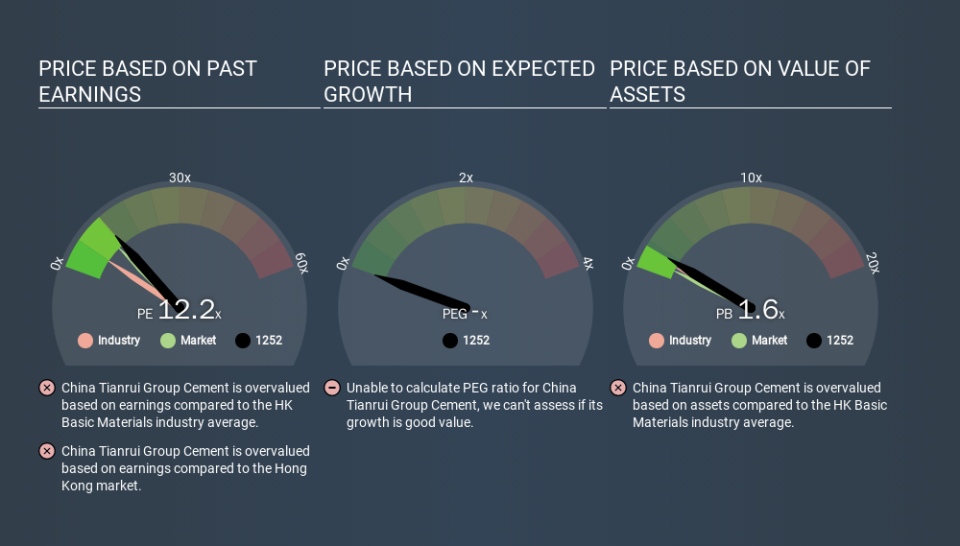Is China Tianrui Group Cement Company Limited's (HKG:1252) High P/E Ratio A Problem For Investors?

This article is for investors who would like to improve their understanding of price to earnings ratios (P/E ratios). We'll apply a basic P/E ratio analysis to China Tianrui Group Cement Company Limited's (HKG:1252), to help you decide if the stock is worth further research. What is China Tianrui Group Cement's P/E ratio? Well, based on the last twelve months it is 12.22. That means that at current prices, buyers pay HK$12.22 for every HK$1 in trailing yearly profits.
See our latest analysis for China Tianrui Group Cement
How Do You Calculate China Tianrui Group Cement's P/E Ratio?
The formula for price to earnings is:
Price to Earnings Ratio = Price per Share (in the reporting currency) ÷ Earnings per Share (EPS)
Or for China Tianrui Group Cement:
P/E of 12.22 = CNY6.44 (Note: this is the share price in the reporting currency, namely, CNY ) ÷ CNY0.53 (Based on the trailing twelve months to June 2019.)
Is A High Price-to-Earnings Ratio Good?
The higher the P/E ratio, the higher the price tag of a business, relative to its trailing earnings. That is not a good or a bad thing per se, but a high P/E does imply buyers are optimistic about the future.
Does China Tianrui Group Cement Have A Relatively High Or Low P/E For Its Industry?
The P/E ratio indicates whether the market has higher or lower expectations of a company. As you can see below, China Tianrui Group Cement has a higher P/E than the average company (5.8) in the basic materials industry.
That means that the market expects China Tianrui Group Cement will outperform other companies in its industry. The market is optimistic about the future, but that doesn't guarantee future growth. So investors should delve deeper. I like to check if company insiders have been buying or selling.
How Growth Rates Impact P/E Ratios
P/E ratios primarily reflect market expectations around earnings growth rates. That's because companies that grow earnings per share quickly will rapidly increase the 'E' in the equation. And in that case, the P/E ratio itself will drop rather quickly. A lower P/E should indicate the stock is cheap relative to others -- and that may attract buyers.
It's nice to see that China Tianrui Group Cement grew EPS by a stonking 34% in the last year. And it has bolstered its earnings per share by 16% per year over the last five years. With that performance, I would expect it to have an above average P/E ratio.
Don't Forget: The P/E Does Not Account For Debt or Bank Deposits
The 'Price' in P/E reflects the market capitalization of the company. In other words, it does not consider any debt or cash that the company may have on the balance sheet. Hypothetically, a company could reduce its future P/E ratio by spending its cash (or taking on debt) to achieve higher earnings.
Such expenditure might be good or bad, in the long term, but the point here is that the balance sheet is not reflected by this ratio.
China Tianrui Group Cement's Balance Sheet
China Tianrui Group Cement has net debt equal to 46% of its market cap. While it's worth keeping this in mind, it isn't a worry.
The Verdict On China Tianrui Group Cement's P/E Ratio
China Tianrui Group Cement trades on a P/E ratio of 12.2, which is above its market average of 10.6. Its debt levels do not imperil its balance sheet and its EPS growth is very healthy indeed. So to be frank we are not surprised it has a high P/E ratio.
Investors should be looking to buy stocks that the market is wrong about. People often underestimate remarkable growth -- so investors can make money when fast growth is not fully appreciated. We don't have analyst forecasts, but shareholders might want to examine this detailed historical graph of earnings, revenue and cash flow.
But note: China Tianrui Group Cement may not be the best stock to buy. So take a peek at this free list of interesting companies with strong recent earnings growth (and a P/E ratio below 20).
If you spot an error that warrants correction, please contact the editor at editorial-team@simplywallst.com. This article by Simply Wall St is general in nature. It does not constitute a recommendation to buy or sell any stock, and does not take account of your objectives, or your financial situation. Simply Wall St has no position in the stocks mentioned.
We aim to bring you long-term focused research analysis driven by fundamental data. Note that our analysis may not factor in the latest price-sensitive company announcements or qualitative material. Thank you for reading.

 Yahoo News
Yahoo News 
